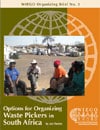Options for Organizing Waste Pickers in South Africa
The main purpose of this booklet is to help waste pickers in South Africa organize themselves, by explaining the different options for workers in their situation. Themes include: explaining the different types of organizations, deciding what the organization’s objective is, determining the kind of provisions it would need to have in a constitution or equivalent document, and developing a well-thought out strategy or plan as to how the workers will work together as an organization.
View list of all: Organizing Briefs

